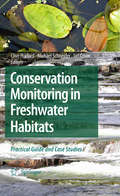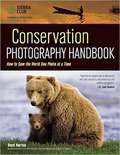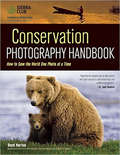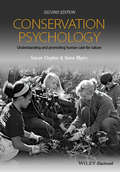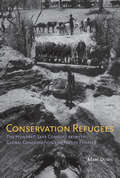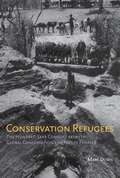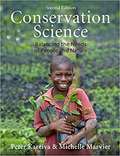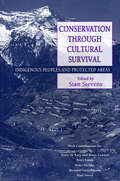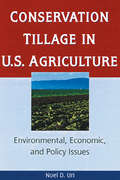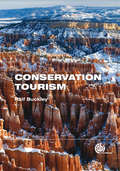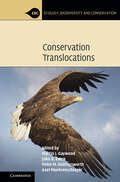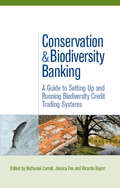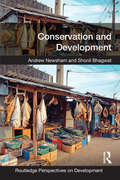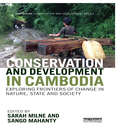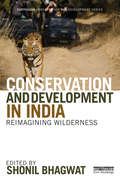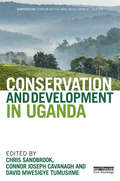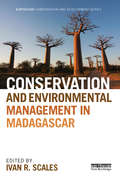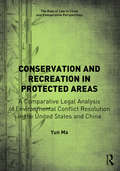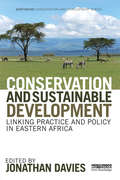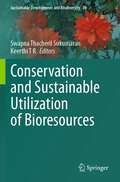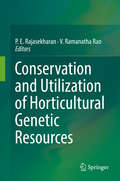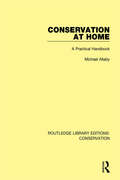- Table View
- List View
Conservation Monitoring in Freshwater Habitats: A Practical Guide and Case Studies
by Michael Schneider Clive Hurford Ian CowxThe predicted changes to global weather patterns and increases in the human population will put unprecedented pressure on European freshwater habitats and the species that depend on them. Our success in conserving the ecological value of these habitats will depend greatly on carefully planned conservation management integrated with efficient and reliable monitoring. "Conservation Monitoring in Freshwater Habitats" focuses on the need to develop clear, site-specific, conservation management goals; something rarely considered in previous publications on freshwater monitoring. The early chapters explore the use of biological indicators for monitoring and provide practical guidance for developing and implementing efficient and reliable monitoring projects. The remainder of the book is dedicated to a series of carefully selected case studies illustrating best practice in both decision-making and application across a range of habitats and species. This timely book will provide a valuable reference for students and researchers in biological and environmental sciences, and for practitioners working in government departments, conservation organizations and ecological consultancies. It will be an essential resource for anyone working towards fulfilling the requirements of both the Water Framework Directive and the EC Habitats Directive.
Conservation Paleobiology: Science and Practice
by Gregory P. Dietl Karl W. FlessaIn conservation, perhaps no better example exists of the past informing the present than the return of the California condor to the Vermilion Cliffs of Arizona. Extinct in the region for nearly one hundred years, condors were successfully reintroduced starting in the 1990s in an effort informed by the fossil record—condor skeletal remains had been found in the area’s late-Pleistocene cave deposits. The potential benefits of applying such data to conservation initiatives are unquestionably great, yet integrating the relevant disciplines has proven challenging. Conservation Paleobiology gathers a remarkable array of scientists—from Jeremy B. C. Jackson to Geerat J. Vermeij—to provide an authoritative overview of how paleobiology can inform both the management of threatened species and larger conservation decisions. Studying endangered species is difficult. They are by definition rare, some exist only in captivity, and for those still in their native habitats any experimentation can potentially have a negative effect on survival. Moreover, a lack of long-term data makes it challenging to anticipate biotic responses to environmental conditions that are outside of our immediate experience. But in the fossil and prefossil records—from natural accumulations such as reefs, shell beds, and caves to human-made deposits like kitchen middens and archaeological sites—enlightening parallels to the Anthropocene can be found that might serve as a primer for present-day predicaments. Offering both deep-time and near-time perspectives and exploring a range of ecological and evolutionary dynamics and taxa from terrestrial as well as aquatic habitats, Conservation Paleobiology is a sterling demonstration of how the past can be used to manage for the future, giving new hope for the creation and implementation of successful conservation programs.
Conservation Photography Handbook: How To Save The World One Photo At A Time
by Boyd NortonThis book is a call to action, providing the tools photographers need to help preserve threatened species and environments around the world or in their own backyards. Author/photographer Boyd Norton has spent over four decades successfully doing just that, and is credited with saving millions of wilderness acres through his photographs and personal activism. In this book, Norton shares his approaches to designing powerful images that communicate the threats facing wilderness areas, wildlife, and people around the world. His expert advice guides you step by step through the process of capturing effective photographs and implementing them to educate and build support for these critically important issues. Also featured are images and techniques from acclaimed conservation photographers Amy Gulick, Alexandra Garcia, Alison M. Jones, Joe Riis, Bob Rozinski, and Wendy Shattil.
Conservation Photography Handbook: How To Save The World One Photo At A Time
by Boyd NortonThis book is a call to action, providing the tools photographers need to help preserve threatened species and environments around the world or in their own backyards. Author/photographer Boyd Norton has spent over four decades successfully doing just that, and is credited with saving millions of wilderness acres through his photographs and personal activism. In this book, Norton shares his approaches to designing powerful images that communicate the threats facing wilderness areas, wildlife, and people around the world. His expert advice guides you step by step through the process of capturing effective photographs and implementing them to educate and build support for these critically important issues. Also featured are images and techniques from acclaimed conservation photographers Amy Gulick, Alexandra Garcia, Alison M. Jones, Joe Riis, Bob Rozinski, and Wendy Shattil.
Conservation Politics: The Last Anti-Colonial Battle
by David JohnsWhilst the science of conservation biology is thriving as a discipline, ultimately global conservation is failing. Why, when the majority of people say they value nature and its protection? David Johns argues that the loss of species and healthy ecosystems is best understood as human imposition of a colonial relationship on the non-human world - one of exploitation and domination. Global institutions benefit from transforming nature into commodities, and conservation is a low priority. This book places political issues at the forefront, and tackles critical questions of conservation efficacy. It considers the role of effective influence on decision making, key policy changes to reduce human footprint, and the centrality of culture in mobilising support. It draws on political lessons from successful social movements, including human anti-colonial struggles, to provide conservation biologists and practitioners in scientific and social science disciplines and NGOs with the tools and wider context to accelerate their work's impact.
Conservation Psychology
by Susan Clayton Gene MyersThis textbook introduces the reader to the new and emerging field of Conservation Psychology, which explores connections between the study of human behavior and the achievement of conservation goals.People are often cast as villains in the story of environmental degradation, seen primarily as a threat to healthy ecosystems and an obstacle to conservation. But humans are inseparable from natural ecosystems. Understanding how people think about, experience, and interact with nature is crucial for promoting environmental sustainability as well as human well-being.The book first summarizes theory and research on human cognitive, emotional, and behavioral responses to nature and goes on to review research on people's experience of nature in wild, managed, and urban settings. Finally, it examines ways to encourage conservation-oriented behavior at both individual and societal levels. Throughout, the authors integrate a wide body of published literature to demonstrate how and why psychology is relevant to promoting a more sustainable relationship between humans and nature.
Conservation Refugees: The Hundred-Year Conflict between Global Conservation and Native Peoples (The\mit Press Ser.)
by Mark DowieHow native people—from the Miwoks of Yosemite to the Maasai of eastern Africa—have been displaced from their lands in the name of conservation.Since 1900, more than 108,000 officially protected conservation areas have been established worldwide, largely at the urging of five international conservation organizations. About half of these areas were occupied or regularly used by indigenous peoples. Millions who had been living sustainably on their land for generations were displaced in the interests of conservation. In Conservation Refugees, Mark Dowie tells this story. This is a “good guy vs. good guy” story, Dowie writes; the indigenous peoples' movement and conservation organizations have a vital common goal—to protect biological diversity—and could work effectively and powerfully together to protect the planet and preserve biological diversity. Yet for more than a hundred years, these two forces have been at odds. The result: thousands of unmanageable protected areas and native peoples reduced to poaching and trespassing on their ancestral lands or “assimilated” but permanently indentured on the lowest rungs of the money economy. Dowie begins with the story of Yosemite National Park, which by the turn of the twentieth century established a template for bitter encounters between native peoples and conservation. He then describes the experiences of other groups, ranging from the Ogiek and Maasai of eastern Africa and the Pygmies of Central Africa to the Karen of Thailand and the Adevasis of India. He also discusses such issues as differing definitions of “nature” and “wilderness,” the influence of the “BINGOs” (Big International NGOs, including the Worldwide Fund for Nature, Conservation International, and The Nature Conservancy), the need for Western scientists to respect and honor traditional lifeways, and the need for native peoples to blend their traditional knowledge with the knowledge of modern ecology. When conservationists and native peoples acknowledge the interdependence of biodiversity conservation and cultural survival, Dowie writes, they can together create a new and much more effective paradigm for conservation.
Conservation Refugees: The Hundred-year Conflict Between Global Conservation And Native Peoples
by Mark DowieSince 1900, more than 108,000 officially protected conservation areas have been established worldwide, largely at the urging of five international conservation organizations. About half of these areas were occupied or regularly used by indigenous peoples. Millions who had been living sustainably on their land for generations were displaced in the interests of conservation. In Conservation Refugees, Mark Dowie tells this story. This is a "good guy vs. good guy" story, Dowie writes; the indigenous peoples' movement and conservation organizations have a vital common goal--to protect biological diversity--and could work effectively and powerfully together to protect the planet and preserve biological diversity. Yet for more than a hundred years, these two forces have been at odds. The result: thousands of unmanageable protected areas and native peoples reduced to poaching and trespassing on their ancestral lands or "assimilated" but permanently indentured on the lowest rungs of the money economy. Dowie begins with the story of Yosemite National Park, which by the turn of the twentieth century established a template for bitter encounters between native peoples and conservation. He then describes the experiences of other groups, ranging from the Ogiek and Maasai of eastern Africa and the Pygmies of Central Africa to the Karen of Thailand and the Adevasis of India. He also discusses such issues as differing definitions of "nature" and "wilderness," the influence of the "BINGOs" (Big International NGOs, including the Worldwide Fund for Nature, Conservation International, and The Nature Conservancy), the need for Western scientists to respect and honor traditional lifeways, and the need for native peoples to blend their traditional knowledge with the knowledge of modern ecology. When conservationists and native peoples acknowledge the interdependence of biodiversity conservation and cultural survival, Dowie writes, they can together create a new and much more effective paradigm for conservation.
Conservation Science: Balancing the Needs of People and Nature
by Peter Kareiva Michelle MarvierNow is the time for conservation science―a mission-oriented scientific enterprise that seeks to protect nature, including Earth’s animals, plants, and ecosystems, in the face of unprecedented human demands upon the planet. Conservation scientists apply principles from ecology, population genetics, economics, political science, and other natural and social sciences to manage and preserve nature. The focus of this textbook is first and foremost on protecting nature and especially Earth’s biota. It also contains a heavy emphasis on highlighting strategies to better connect the practice of conservation with the needs and priorities of a growing human population. <p><p> Now used at over 150 colleges and universities, Conservation Science is an original and modern approach to conservation. Gretchen Daily (Stanford University) says it well: “Based on unparalleled, firsthand experience, Kareiva and Marvier explore the innovative approaches to conservation being honed around the world today. Their account is rigorous and engaging, with fresh questions, data, and quantitative analysis interwoven with vivid stories of actual conservation practice in the field." <p><p> Conservation Science was primarily written primarily for undergraduates and beginning graduate students who are interested either in academic careers or working in conservation at government agencies, non-governmental organizations, or international institutions.
Conservation Through Cultural Survival: Indigenous Peoples And Protected Areas
by Bernard Nietschmann Stanley Stevens Peter Herlihy Paul Sneed Terry Delacy DeanFor more than a century the establishment of national parks and protected areas was a major threat to the survival of indigenous people. The creation of parks based on wilderness ideals outlawed traditional ways of life and forced from their homelands peoples who had shaped and preserved local ecosystems for centuries.Today such tragic conflicts are being superseded by new alliances for conservation. Conservation Through Cultural Survival assesses cutting-edge efforts to establish new kinds of parks and protected areas which are based on partnerships with indigenous peoples. It chronicles new conservation thinking and the establishment around the world of indigenously inhabited protected areas, provides detailed case studies of the most important types of co-managed and indigenously managed areas, and offers guidelines, models, and recommendations for international action. The book: discusses the goals and development of the global protected area system assesses the strengths and limitations of a range of different types of indigenously inhabited protected areas discusses key issues and indigenous peoples' concerns recommends measures to promote conservation suggests international actions that would promote co-managed and indigenously managed areas Contributors who have been actively involved in projects around the world provide in-depth accounts from Nepal, Australia, New Guinea, Nicaragua, Honduras, Canada, and Alaska of some of the most promising efforts to develop protected areas where indigenous peoples maintain their rights to settlement and subsistence and participate in management.Conservation Through Cultural Survival will be required reading for environmentalists, protected area planners and managers, and all who care about the future of indigenous peoples and their homelands.
Conservation Tillage in U.S. Agriculture: Environmental, Economic, and Policy Issues
by Noel UriDiscover farming techniques that will decrease soil erosion and costs!Soil erosion from U.S. croplands has long been recognized as a national problem. Conservation Tillage in U.S. Agriculture: Environmental, Economic, and Policy Issues is the first ever complete study of the costs and benefits of using conservation tillage to prevent soil erosion. Designed for professionals working in the areas of soil science, agronomy, economics, environmental studies, and agriculture, this complete study covers everything from machinery and trends in conservation tillage to its adoption to use in regions of the United States.With this in-depth manual, you will examine different types of tillage and the many benefits this practice can ensure, such as improving water quality, increasing organic matter in your soil, sequestering carbon, and providing habitat and food for wildlife. Covering the economic, environmental, and policy issues of this practice, Conservation Tillage in U.S. Agriculture features: the history of conservation tillage case studies on costs and benefits of differing conservation tillage practices with various crops tables and graphs of trends, and case studies concerning the use of different farming methods U.S. Department of Agriculture soil conservation policies how to prevent soil erosion without harming the environment factors affecting conservation tillage, adoption, and use for crops such as peanuts, potatoes, beets, tobacco, and vegetables. With the help of this book, you will measure the benefits and costs of conservation tillage based on profitability and environmental impact and explore the positive and negative environmental consequences that may involve air, land, water, and/or the health and ecological status of wildlife. Conservation Tillage in U.S. Agriculture is a timely and informative look at conservation tillage practices that will help you improve residue management and create better conditions for wildlife and the environment.
Conservation Tourism
by Ralf BuckleyThis book considers the positive contributions that tourism can make to the conservation of global biodiversity, by reviewing and analyzing the economic and political contributions of tourism to conservation through establishment of private game and wildlife reserves, lodges and tourist facilities.
Conservation Translocations (Ecology, Biodiversity and Conservation)
by John G. Ewen Martin J. Gaywood Peter M. Hollingsworth Axel MoehrenschlagerConservation translocation - the movement of species for conservation benefit - includes reintroducing species into the wild, reinforcing dwindling populations, helping species shift ranges in the face of environmental change, and moving species to enhance ecosystem function. Conservation translocation can lead to clear conservation benefits and can excite and engage a broad spectrum of people. However, these projects are often complex and involve careful consideration and planning of biological and socio-economic issues. This volume draws on the latest research and experience of specialists from around the world to help provide guidance on best practice and to promote thinking over how conservation translocations can continue to be developed. The key concepts cover project planning, biological and social factors influencing the efficacy of translocations, and how to deal with complex decision-making. This book aims to inspire, inform and help practitioners maximise their chances of success, and minimise the risks of failure.
Conservation and Biodiversity Banking: A Guide to Setting Up and Running Biodiversity Credit Trading Systems (Environmental Market Insights Ser.)
by Jessica Fox Ricardo Bayon Nathaniel CarrollThe conservation of biodiversity is now big business. Whether called conservation banking, species banking, habitat banking, biodiversity banking, biodiversity offsets, compensatory mitigation or ecological footprint offsetting, the idea of financially valuing biodiversity and using the market and businesses to promote conservation is growing rapidly. This handbook is a comprehensive guide to conservation banking, explaining what it is and how it works. Written by leading ecosystem market experts, the book provides practical guidance, tools, case studies, analysis and insights into conservation banking and other market-based approaches to conservation. Coverage includes the origins of conservation banking, the pros and cons for conservation, how conservation banking works in reality, the legal, practical and financial aspects of setting up and running a conservation bank and how 'biodiversity off-sets' can be internationalized. Published with Ecosystem Marketplace
Conservation and Development (Routledge Perspectives on Development)
by Andrew Newsham Shonil BhagwatConservation and development share an intertwined history dating back to at least the 1700s. But what are the prospects for reconciling the two, and how far have we come with this project? This book explores these questions through a detailed consideration of the past, present and future of the relationship between conservation and development. Bringing to bear conceptual resources from political ecology, social-ecological systems thinking and science and technology studies, Conservation and Development sets this relationship against the background of the political and economic processes implicated in environmental degradation and poverty alike. Whilst recognising that the need for reconciling conservation and development processes remains as compelling as ever, it demonstrates why trade-offs are more frequently encountered in practice than synergies. It also flags alternative visions for conservation and development obscured or ignored by current framings and priorities. Bringing together policy and theory, Conservation and Development is an essential resource for undergraduate and postgraduate students and a useful reference for researchers in related fields. Each chapter contains a reading guide with discussion questions. The text is enlivened by a number of new case studies from around the world. A must-read for anyone interested in understanding the history, current state, and projections for future shifts in the relationship between conservation and development.
Conservation and Development in Cambodia: Exploring frontiers of change in nature, state and society (Earthscan Conservation and Development)
by Sarah Milne Sango MahantyWritten by leading authorities from Australasia, Europe and North America, this book examines the dynamic conflicts and synergies between nature conservation and human development in contemporary Cambodia. After suffering conflict and stagnation in the late twentieth century, Cambodia has experienced an economic transformation in the last decade, with growth averaging almost ten per cent per year, partly through investment from China. However this rush for development has been coupled with tremendous social and environmental change which, although positive in some aspects, has led to rising inequality and profound shifts in the condition, ownership and management of natural resources. High deforestation rates, declining fish stocks, biodiversity loss, and alienation of indigenous and rural people from their land and traditional livelihoods are now matters of increasing local and international concern. The book explores the social and political dimensions of these environmental changes in Cambodia, and of efforts to intervene in and ‘improve’ current trajectories for conservation and development. It provides a compelling analysis of the connections between nature, state and society, pointing to the key role of grassroots and non-state actors in shaping Cambodia’s frontiers of change. These insights will be of great interest to scholars of Southeast Asia and environment-development issues in general.
Conservation and Development in India: Reimagining Wilderness (Earthscan Conservation and Development)
by Shonil BhagwatDespite decades of efforts to integrate conservation and development, India is torn between two very different worldviews of peoples’ place in the country’s natural environment. This book takes a critical look at nature conservation and poverty alleviation in India. It opens up discussion of the conservation–development nexus in a country that stands at a major crossroads, where forces of neoliberalism, globalisation and urbanisation are driving the future of India’s environment. As the book shows, conservation in India is increasingly concerned with creating ‘theme parks’ – inviolate, albeit isolated, spaces for wild nature, whereas development is concerned with fast-tracking the construction of built infrastructure while also rolling out nationwide welfare programmes – promising food, clothing and shelter for the poorest of the poor living in rural India. Conservation and development therefore have very different motivations and attempts to find a common ground have been fraught with challenges. This has been particularly so on the fringes of wildlife parks, where the rural poor come in frequent contact with wild animals to the detriment of both people and wildlife. Chapters are written by leading scholars on India to provide a vision of the future of Indian nature conservation. Whilst focused on India, the book will also be of interest to scholars and researchers of conservation and development more globally. As a ‘rising power’, the world’s eyes are set on India’s development trajectory and there is unprecedented interest in the course of development that the world’s largest democracy takes in the decades to come.
Conservation and Development in Uganda (Earthscan Conservation and Development)
by Chris Sandbrook Connor Joseph Cavanagh David Mwesigye TumusiimeUganda has extensive protected areas and iconic wildlife (including mountain gorillas), which exist within a complex social and political environment. In recent years Uganda has been seen as a test bed and model case study for numerous and varied approaches to address complex and connected conservation and development challenges. This volume reviews and assesses these initiatives, collecting new research and analyses both from emerging scholars and well-established academics in Uganda and around the globe. Approaches covered range from community-based conservation to the more recent proliferation of neoliberalised interventions based on markets and payments for ecosystem services. Drawing on insights from political ecology, human geography, institutional economics, and environmental science, the authors explore the challenges of operationalising truly sustainable forms of development in a country whose recent history is characterised by a highly volatile governance and development context. They highlight the stakes for vulnerable human populations in relation to of large and growing socioeconomic inequalities, as well as for Uganda’s rich, unique, and globally significant biodiversity. They illustrate the conflicts that occur between competing claims of conservation, agriculture, tourism, and the energy and mining industries. Crucially, the book draws out lessons that can be learned from the Ugandan experience for conservation and development practitioners and scholars around the world.
Conservation and Environmental Management in Madagascar (Earthscan Conservation and Development)
by Ivan R. ScalesMadagascar is one of the most biologically diverse places on the planet, the result of 160 million years of isolation from the African mainland. More than 80% of its species are not found anywhere else on Earth. However, this highly diverse flora and fauna is threatened by habitat loss and fragmentation, and the island has been classified as one of the world’s highest conservation priorities. Drawing on insights from geography, anthropology, sustainable development, political science and ecology, this book provides a comprehensive assessment of the status of conservation and environmental management in Madagascar. It describes how conservation organisations have been experimenting with new forms of protected areas, community-based resource management, ecotourism, and payments for ecosystem services. But the country must also deal with pressing human needs. The problems of poverty, development, environmental justice, natural resource use and biodiversity conservation are shown to be interlinked in complex ways. Authors address key questions, such as who are the winners and losers in attempts to conserve biodiversity? And what are the implications of new forms of conservation for rural livelihoods and environmental justice?
Conservation and Management of Tropical Rainforests, 2nd Edition
by Eberhard F. BruenigThis new edition of Conservation and Management of Tropical Rainforests applies the large body of knowledge, experience and tradition available to those who study tropical rainforests. Revised and updated in light of developments in science, technology, economics, politics, etc. and their effects on tropical forests, it describes the principles of integrated conservation and management that lead to sustainability, identifying the unifying phenomena that regulate the processes within the rainforest and that are fundamental to the ecosystem viability. Features of the natural forest and the socio-cultural ecosystems which can be mimicked in the design of self-sustaining forests are also discussed. A holistic approach to the management and conservation of rainforests is developed throughout the book. The focus on South-East Asian forestry will be widened to include Africa and Latin America. Recent controversial issues such as biofuels and carbon credits with respect to tropical forests and their inhabitants will be discussed. This book is a substantial contribution to the literature, it is a valuable resource for all those concerned with rainforests.
Conservation and Recreation in Protected Areas: A Comparative Legal Analysis of Environmental Conflict Resolution in the United States and China (The Rule of Law in China and Comparative Perspectives)
by Yun MaThis book provides a comprehensive and up to date comparative study of the management and resolution of conflicts between conservation and recreation in protected areas in the US and China. Competing claims on the use of nature, increasing regulation of land use and recreational activities, and the conflicting goals between conservation and development have led to a rise in conflicts in the designation and management of protected areas. How to effectively manage and resolve these conflicts has become a challenge for both legislators and managers. By adopting an institutional dimension in legal interpretation, this book critically examines how such conflicts are dealt with in the legal regimes of the US and China while exploring interactions between legislatures, agencies and courts. The book searches for a plausible solution to improve the legal framework of protected areas in China by emulating pertinent mechanisms developed in the US, whilst also presenting legal and policy recommendations to the US. This informative book will be useful for legal scholars in Chinese law, nature conservation law, administrative law and comparative law.
Conservation and Sustainable Development: Linking Practice and Policy in Eastern Africa (Earthscan Conservation and Development)
by Jonathan DaviesThe links between policy and practice in natural resource management are often depicted as a cyclical and rational process. In reality, policymaking and implementation are often irrational, unpredictable and highly political. Many science and knowledge-based institutions undertake rigorous research with the aim of influencing policy, but often their influence is much less than intended. Understanding who influences policy at different levels, and how, is crucial to ensure that science is deployed most effectively so as to have an influence on conservation and natural resource management. Conservation and Sustainable Development presents a variety of innovative ways that have been used to influence policy processes, from community pressure groups through elected and unelected leaders, to scientific discourse at the levels of directors of economic planning and conservation. This book analyzes experiences from a variety of conservation interventions by the International Union for Conservation of Nature (IUCN) and other agencies, primarily in Eastern Africa, and challenges the notion of policymaking as a cyclical process. It elaborates on this theme and presents an array of examples of how communities have influenced government, through direct lobbying, influence of parliamentarians, wielding of science and research, and inter-community dialogue, networking and solidarity. The authors present a framework for understanding and strategizing such work so that other institutions can identify where they can best add value.
Conservation and Sustainable Utilization of Bioresources (Sustainable Development and Biodiversity)
by Swapna Thacheril Sukumaran Keerthi T RThis book brings together chapters related to sustainable utilization of biological resources, including in situ and ex situ conservation of rare, endangered, and threatened plants. The title also gives a special emphasis on marine sponges and mangrove ecosystems, which are two important untapped potential resources of the marine ecosystem and play a key role in maintaining the marine ecosystem. There is an urgent need for the conservation, exploration and utilization of bioresources for the growth and survival of human beings. Due to the significant reduction in biological resources, many countries are developing strategic action plans for the conservation and sustainable use of biological resources. That is where this book fills the gap by discussing the significant development of new products and methodologies for sustainable utilization of these resources. This book also unveils a world of novel bioactive molecules from medicinal plants and the marine ecosystem and explains how drug design pipelines can advance modern drug development. The target audiences for this book include biodiversity researchers who are working on technology and bioresource management issues and faculty and students in the environment research areas and Biodiversity conservation.
Conservation and Utilization of Horticultural Genetic Resources
by P. E. Rajasekharan V. Ramanatha RaoThe conservation of crop genetic resources is one of the important elements in efforts to sustainably increase agricultural production in low-income countries, and to guarantee long-term food security, especially for the low-income population groups in these countries. Horticultural crops, as high-value crops, have an important role to play in revitalizing rural economies and can add significantly to national economies. Moreover, horticulture provides more than twice the number of jobs compared to traditional cereal crop production, and the shifting of conventional agriculture towards high-value horticulture has increased employment opportunities in developing countries. To exploit this potential, researchers need a vast array of horticultural genetic resources and information on new traits. Horticultural crops, which are only a part of PGRFA (Plant Genetic Resources for Food and Agriculture), are characterized by a wide and varied range of species. In fact, there are five major horticultural crop groups: fruit and nut crops, vegetables, food legumes, roots and tubers, and lastly the ornamental and medicinal group. In this context, the present book provides a comprehensive overview of the current state of conservation and utilization of horticultural genetic resources, addressing contemporary approaches to conservation in connection with different technologies, including biotechnological approaches as practised in India and in some cases, globally. It includes a brief chapter on the unique nature of horticultural genetic resources, providing a rationale for viewing them as being distinct from field crop genetic resources. Subsequent chapters share insights on protocols for the conservation of selected horticultural crops ex situ, and focus on the increased need to complement these efforts with in situ conservation approaches. Geospatial tools are also briefly described, emphasizing their utility with regard to mapping and managing resources. The book also explores the wild gene pool in horticulture crops; discusses legal aspects related to horticultural genetic resources and biotechnological aspects; and describes the key aspects of sustainable management and replenishment. Given its scope, the book offers a valuable resource for all horticulturists, graduate students, researchers, policymakers, conservationists, and NGOs engaged in horticulture in particular and biodiversity in general.
Conservation at Home: A Practical Handbook (Routledge Library Editions: Conservation #1)
by Michael AllabyOriginally published in 1988, Conservation at Home looks at practical methods of conservation that can be carried out within the home. Still as relevant today, as it was at the time of publication, this book gives practical and authoritative advice on a wide range of activities and products that can materially affect our environment. From the fabric and fuel, we use to keep warm, to the utensils and chemicals we clean with and the food we eat this book provides detailed information on how our domestic lives are affecting not only the natural world, but also ourselves as humans. Complete with detailed illustrations, this concise and useful book provides an ecologically conscious guide to living at home. This volume will be of interest to those researching and working in the field of ecology and conservation as well as for more general readerships.
